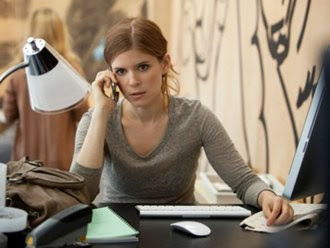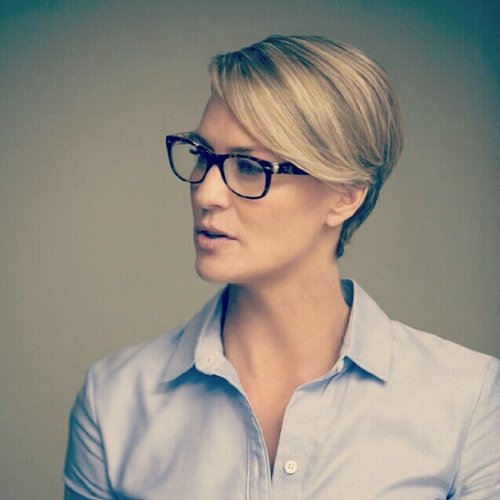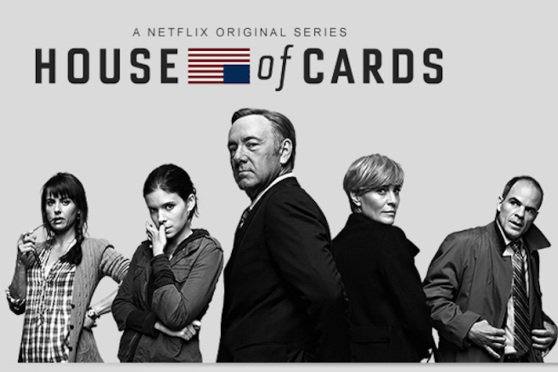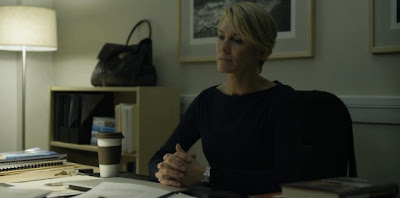 |
| House of Cards poster |
Written by Amanda Rodriguez
 |
| “Okay, so you think when a woman asks to be treated with respect, that’s arrogance?” – Zoe Barnes |
 |
| “Tough as a two dollar steak.” – Frank Underwood of Linda Vasquez…too bad she’s not actually Latina |
 |
| “I won’t let people like you fuck up the world my child has to live in [even] if I have to tell a few lies…” – Gillian Cole to Claire Underwood |
 |
| Janine Skorsky in House of Cards |
 |
| “No, I’m not going to ask for your blessing on every decision I make.” – Claire Underwood to Frank Underwood |
One of the first meaningful interactions we get with Claire is when she fires 18 staff members in order to create a new water well building project while not taking donations from SanCorp, a source that would indebt her husband for political favors. She has Evelyn Baxter, her office manager, do the dirty work, and then Claire proceeds to fire Evelyn because she was vocal in her concerns about the mass layoffs. The impression this gives us of Claire is that she is cold, calculating, and completely intractable. More than a match for her husband, the master manipulator Frank, Claire is willing to do whatever it takes to achieve her goals, regardless of whether she must apply her cutthroat ambition to a philanthropic enterprise like well building.
 |
| “I love that woman. I love her more than sharks love blood.” – Frank Underwood of Claire Underwood |
Though the layoffs at her job set Claire up as the restrained, soft-spoken, heartless “ice queen,” we later find that these sorts of sacrifices actually affect her deeply when she uses her status as Frank’s only completely trusted ally in order to sabotage his education bill for her own gains. After repeatedly asking for her husband’s help with finances and influence (because his political aspirations have grievously limited those things for her organization) and after repeatedly being rebuffed and ignored by him, Claire, as a favor to Frank, agrees to speak to a couple of representatives who are leaning against voting for his education bill. By intentionally not swaying these votes, Claire causes the bill to fail and therefore secures the necessary influence with the Sudanese government she needs to begin her well building project. When Frank confronts her, we see Claire’s most impassioned response of the entire season:
“[I did it] For myself. I can’t operate based on plans you haven’t shared with me…I don’t feel as though I’m standing beside you…I fired half of my staff for us. I have turned down donations for us. I drafted Peter’s bill for us. I diverted time and energy…for us…Be honest about how you’re using me just like you use everyone else. That was not part of the bargain.”
Claire asserts that Frank hasn’t behaved in keeping with their agreement, their partnership. She makes it clear that she will not allow him to take advantage of her and that if they’re not working as a unit, she will take matters into her own hands to meet her needs and objectives. Claire then proceeds to leave town to visit with a former lover of hers, thus also meeting the emotional needs that Frank has neglected. Her independence and her unwillingness to tolerate Frank’s complacency here are admirable.
 |
| The imperious Claire Underwood |
The marriage between Claire and Frank is also unique. Claire recounts Frank’s marriage proposal:
“Claire, if all you want is happiness say no. I’m not going to give you a couple of kids and count the days until retirement. I promise you freedom from that, I promise you’ll never be bored…He was the only one who understood me. He didn’t put me on some pedestal, he knew that I didn’t want to be adored or coddled.”
They have a very open, autonomous, conspiratorial relationship wherein they sleep with other people and keep no secrets from each other. I do question the fact that Claire’s affair with Adam has genuine depth and substance, while Frank’s affair with Zoe is a blatant cliche replete with the middle-aged married man sleeping with the young ingenue, the power dynamics grossly skewed (though even that tryst ends up taking us into surprising places). The two affairs are in keeping with the notion that men can have casual sex and women cannot because they require an emotional connection.
I also question Claire’s rising desire to have children. Is this budding maternal instinct meant to humanize her? The idea that she had always wanted children but repressed her desires to accommodate Frank’s hatred of children is not at all in keeping with her character. Since when does she relegate her wants to the backseat, especially for decades? I do, however, appreciate the continued independence that she shows in this regard, seeking fertility treatments without Frank’s knowledge because he has failed her as a partner. Not only that, but the pregnancy itself could be a strategic play to thwart Gillian’s lawsuit for wrongful termination due to pregnancy discrimination; the logic being: how could one pregnant woman wrongfully fire another pregnant woman due to her pregnancy?
 |
| Claire Underwood in House of Cards |
There’s no denying that despite her highly suspect morality, Claire Underwood is an extraordinarily powerful woman. Her power stems from a confidence in her capability, her intelligence, and her ambition. Claire has power because she knows she has power. She has power because she’s taken it and guards it fiercely. Is she a decent person? Absolutely not. Is she a feminist role model? Probably not. But representations of nuanced powerful female characters are in short supply in Hollywood. I’d love to see more women (on screen and off) with Claire’s sense of her own strength and self-worth. Let’s hope Netflix is onto something, and keep our fingers crossed that House of Cards Season 2 is just as rich with complex women as its first season was.




